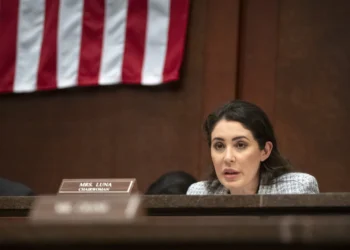National Public Radio pocketed $80 million a year in taxpayer money as a hard left-wing media outlet for decades. If Republicans succeed in kicking it off the dole this year, it will be because NPR crossed the line from liberal media to anti-conservative activists.
In the name of policing “misinformation,” NPR began pushing for censorship of conservative arguments and facts that harmed Democrats. Its left-wing bias gave way to naked deception, and a total intolerance of opposing views took hold.
Republicans never liked NPR, but they were unwilling to expend enough political capital to cut off federal funding from an institution that was merely very liberal. Once that institution became hostile toward and intolerant of half the country, ruling its views out of bounds and nakedly boosting one party, the knives came out.
To track when NPR crossed this line, we could look at the heady days of 2020, with Hunter Biden’s laptop.
Beginning on Oct. 14, 2020, the New York Post reported a series of revelations from Biden‘s laptop.
Among the revelations: Biden brought his father (then-Vice President Joe Biden) to a private dinner with an executive from Ukrainian energy company Burisma, which was paying Hunter Biden generously to sit on its board.
This was just one of the details about Hunter Biden’s influence peddling that the outlet reported on weeks before Joe Biden won the White House.
The average liberal outlet ignored the story until after the election. After all, it reflected poorly on the Democratic presidential nominee.
NPR went further than most, though. The outlet put out a statement bragging about ignoring the story, and implicitly scolding any media outlets that even mentioned the New York Post’s report, much less followed up on its reporting.
“Why haven’t you seen any stories from NPR about the NY Post’s Hunter Biden story?” NPR asked on X, rhetorically. Terence Samuels, managing editor for news, gave this answer: “We don’t want to waste our time on stories that are not really stories, and we don’t want to waste our listeners’ and readers’ time on stories that are just pure distractions.”
For context on NPR’s idea of “really stories,” consider that the outlet’s other stories that day included a report on a “young adult graphic novel” titled Flamer, which is about a gay Boy Scout. Another story reported on a hobbyist who makes “hand-cranked robots.” The corrupt influence peddling of the son of the presidential front-runner ranked below these, NPR concluded.
If you comb through NPR’s archives for the day they ran their proud denial, you will see that every single story it published that day, if it touched on politics, was a positive story about Democrats and liberals or a negative story about President Donald Trump, Republicans, or conservatives. That’s election-season NPR, and there’s no room for anything that might reflect poorly on the Democratic nominee.
(That afternoon, NPR also tried to fundraise off its decision to cover up the Hunter Biden story, posting, “NPR is your source for trustworthy news and contextual reporting. Make a donation to your local NPR station today … ”)
The point here isn’t that NPR omitted a story harmful to Democrats. It’s that NPR publicly declared that omitting this story was its duty. The context here is crucial: In these same hours, X and Facebook decided to throttle access to the story about Hunter Biden’s laptop, and even ban links to the New York Post entirely.
In line with NPR’s self-righteous proclamations, Big Tech decided that it was the duty of everyone with power to hide this story ahead of the election.
This is where you can see the difference between a uniformly liberal media outlet and a verified aggressor in the culture war. NPR saw its job not as simply a purveyor of liberal opinions and left-wing reporting, but as an enforcer of uniformity, which means trying to drum the Right out of polite society — all while taking in tax dollars.
The pandemic provided plenty more examples of NPR behaving as the thought police rather than a news outlet.
In April 2020, NPR didn’t merely say it didn’t believe the virus came from a wet market rather than a laboratory. Instead, it declared the lab-leak hypothesis “misinformation.”
Citing experts, NPR said, “There is virtually zero chance that the novel coronavirus was released as a result of a lab accident, despite misinformation being circulated.”
Branding inconvenient theories or facts as “misinformation” is a way of not merely declaring them wrong but also dangerous and unworthy of free speech protections.
Before “misinformation” was the buzzword, and before former President Barack Obama made “fake news” a popular phrase, fact-checking was how the liberal media tried to smuggle in some added credibility for its viewpoint.
NPR was always free to say “we believe Fox News is not framing this correctly,” or “we disagree with the Republican governor’s policies,” but this way of writing would frame the disagreement as a debate with two sides. However, NPR’s project over the past decade has been to brand center-right viewpoints out of bounds. And so it wielded fact-checks for exactly that purpose.
Of course, this resulted in absurd “fact-checks.”
On March 31, 2020, NPR ran this astounding headline: “FACT CHECK: Trump Praises Florida Governor Despite Criticism Of Coronavirus Response.”
The “fact check” pointed out that while Trump said Gov. Ron DeSantis (R-FL) is “a great governor” who “knows exactly what he’s doing,” others disagreed. Specifically, NPR cited a lawsuit by a Democratic politician who wore a grim reaper outfit on the beach, said letting Floridians walk outdoors would cause mass death, and demanded a full lockdown of the state (presumably arresting folks who stepped outside).
The suit NPR leaned on as an authority was immediately and repeatedly dismissed in court. One state court imposed sanctions on Florida Attorney Daniel Uhlfelder because his case was so obviously frivolous and political.
That’s an NPR “fact-check” of Trump: Trump praised DeSantis, but some partisan hack lawyer says DeSantis is bad, so Trump must be wrong.
On the most polarized topics, NPR consistently uses its fact-checks to simply put its thumb on one side of the scale. For instance, in 2021, NPR tried to declare that the pulsing of the fetal heart was not a fetal heartbeat. The article falsely said an ultrasound picks up only “electrical activity from cells.” Ultrasounds don’t detect electrical activity. They detect tissue, and thus the movement of tissue.
This is how NPR treats any disagreement, though. For instance, in an article on the debate over wind turbines and whether they affect property values, NPR quoted experts on both sides, yet still branded all resistance to wind energy as “misinformation.”
One irony of the media’s misinformation police is its tendency to deliberately obscure the truth.
The media types most vigilant about policing misinformation do not see their job as merely telling the truth and reporting the facts but as guiding the public toward correct beliefs — that’s why they try so hard to ensure that “misinformation” never sees the light of day.
But excluding supposed falsehoods is not adequate for this task. Sometimes, to guide the masses to the correct opinion, it’s necessary to slant the story — a lot.
NPR, more than most news outlets, dealt in these “noble lies.” The pandemic, when NPR and other elite outlets believed that controlling information was necessary to save lives, was prime time for this practice.
Joe Rogan, a prominent anti-establishment podcaster, got COVID-19 in summer 2021 and announced he was trying multiple treatments, including monoclonal antibodies and ivermectin. Ivermectin, a drug generally prescribed to treat ringworm, was never proven to be an effective treatment for COVID-19, but hundreds of thousands of Americans got prescriptions for the drug in the hope that it would alleviate symptoms.
Ivermectin also has a livestock formulation available as a paste at farm supply stores.
Rogan got a prescription from a doctor for the normal human formulation of Ivermectin to treat his COVID-19. There are arguments NPR could have made against this: Ivermectin is unproven as a COVID-19 therapeutic, and taking drugs needlessly isn’t great. But liberal media types also feared that faith in COVID-19 therapeutics (including monoclonal antibodies) might reduce demand for COVID-19 vaccines, so they felt that all therapeutics needed to be attacked vigorously.
Thus, they decided to mislead their readers about what Rogan was taking.
NPR posted this on X: “The podcast host Joe Rogan, who has dismissed COVID vaccines, said he tested positive and is taking a cocktail of unproven treatments — including ivermectin, a deworming drug for cows that the FDA warns people should not ingest…. No, you should not ingest ivermectin, a drug formulated for cows and horses to treat parasites.”
As the social media replies showed, NPR successfully fooled its readers into believing that Ivermectin is only a livestock drug and that it is always unsafe for humans. The article also clearly implied that monoclonal antibodies are unsafe, omitting that the Food and Drug Administration had approved monoclonal antibodies as a COVID-19 treatment.
It was, from top to bottom, a misleading article. Read it if you like. It’s indefensible if the mission is to inform readers. But in the service of mocking Rogan and discouraging any alternatives to COVID-19 vaccines, a moderate dose of deception presumably seemed justified.
Perhaps the low point of American experts’ abuse of authority was the June 2020 letter from public health experts saying that while all public gatherings should be banned, there had to be an exception for protests they supported — to wit, the Black Lives Matter protests.
NPR swallowed this argument wholesale as it fit perfectly into its understanding of what “experts” ought to do: take a political side and declare it beyond debate.
From 2020 to 2022, NPR clearly established itself not as a news outlet with a slant, but as a warrior trying to rid many opinions and facts from the public square.
NPR EDITOR-IN-CHIEF LEAVES OUTLET AFTER CONGRESS PULLS FUNDING
What underlies this is a belief that the American Right is not merely mistaken but illegitimate.
With this attitude, it’s gobsmacking that NPR believed it could continue to demand federal money for itself and its member stations.















